-
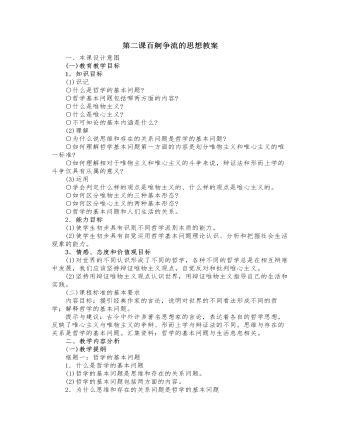
人教版高中政治必修4第二课百舸争流的思想教案
不可知论是否认人们认识世界或彻底改造世界的可能性的哲学学说。此概念首先由英国的赫胥黎(1825—1895)于1869年提出,不可知论的思想在古代就已产生,欧洲近代的主要代表是休谟和康德。其本质是把人的感觉看作是主观和客观之间的屏障而不是桥梁,不承认在感觉之外有确实可靠的客观外部世界的存在,不懂得认识过程中本质与现象、有限与无限的辩证关系。对不可知论最有力的驳斥是实践。有时不可知论一词也用以专指针对宗教教义而提出的一种学说,认为上帝是否存在、灵魂是否不朽是不可知的。2.二元论二元论是认为世界有两个本原的哲学学说,与一元论相对立,它把物质和意识绝对对立起来,认为物质和意识是两个各自独立、相互平行发展着的实体,谁也不产生谁,谁也不决定谁,都是世界的本原。它的观点是错误的:它肯定精神不依赖于物质而独立存在,这本身就是唯心主义的观点;它虽然承认物质是独立的本原,但在说明物质和精神的关系时,又把精神说成是唯一具有能动性的力量,必然倒向唯心主义。主要代表人物是法国的笛卡儿和德国的康德。
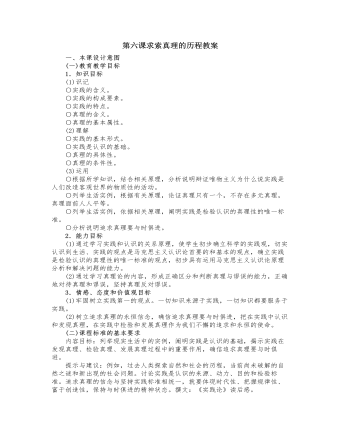
人教版高中政治必修4第六课求索真理的历程教案
农业科学的周期是以年为时间单位,一次实验就要等到一次花开、结果。就这样,几个实验误导了袁隆平好几年。这时登在《参考消息》上的一篇不起眼的文章像给迷途中的袁隆平以当头一棒:克里克、沃森和威尔金斯发现DNA螺旋结构,西方的遗传学研究进入分子水平。“我当时还在那里搞什么无性杂交,糟糕得很”。水稻是自花授粉植物,雄蕊雌蕊都在一朵花里面,雌雄同株,没有杂种优势一杂种优势是生物界的普遍现象,小到细菌,大到人,近亲繁殖的结果是种群的退化。但是水稻因为花小,其杂交是当时公认的世界难题,设在马尼拉的世界水稻研究中心就是因为困难重重,差点关闭。袁隆平偏不信这个邪,他突发灵感:专门培养一种特殊的水稻品种——雄花退化的雄性不育系,没有自己的花粉,这样不就可以做到杂种优势了吗?于是,漫长的寻找过程开始了,要找到这样一株雄花退化而且杂交之后产量猛增的“太监”水稻简直是大海捞针。
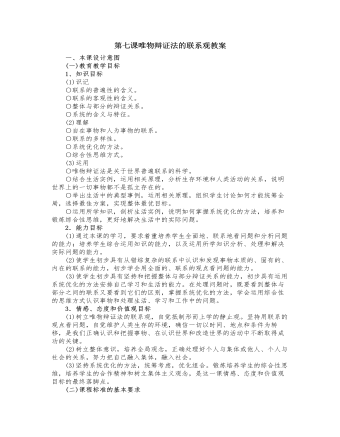
人教版高中政治必修4第七课唯物辩证法的联系观教案
2.能力目标(1)通过本课的学习,要求着重培养学生全面地、联系地看问题和分析问题的能力;培养学生综合运用知识的能力,以及运用所学知识分析、处理和解决实际问题的能力。(2)使学生初步具有从错综复杂的联系中认识和发现事物本质的、固有的、内在的联系的能力,初步学会用全面的、联系的观点看问题的能力。(3)使学生初步具有坚持和把握整体与部分辩证关系的能力,初步具有运用系统优化的方法安排自己学习和生活的能力。在处理问题时,既要看到整体与部分之间的联系又要看到它们的区别,掌握系统优化的方法,学会运用综合性的思维方式认识事物和处理生活、学习和工作中的问题。3.情感、态度和价值观目标(1)树立唯物辩证法的联系观,自觉抵制形而上学的静止观。坚持用联系的观点看问题,自觉维护人类生存的环境,确信一切以时间、地点和条件为转移,是我们正确认识和把握事物、在认识世界和改造世界的活动中不断取得成功的关键。
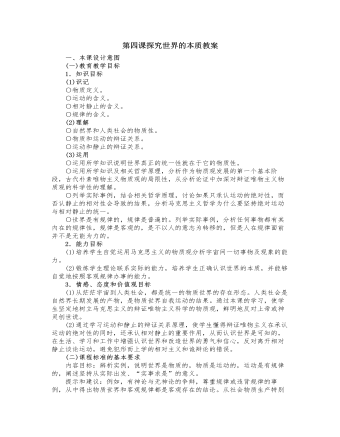
人教版高中政治必修4第四课探究世界的本质教案
二是中国人口多、资源相对不足日益成为制约发展的突出矛盾。我国人均水资源拥有量仅为世界平均水平的1/4,600多个城市中,400多个缺水,其中110个严重缺水。我国人均耕地拥有量不到世界平均水平的40%。石油、天然气、铜和铝等重要矿产资源的人均储量分别只占世界人均水平的8.3%、4.1%、25.5%、9.7%。三是我国这20年来经济快速发展,能源浪费大、环境破坏严重等问题日益凸显,人与自然的矛盾从未像今天这样突出。无序、无度的消耗,迅速透支我们宝贵的资源。以下是来自国家环保总局的一组沉甸甸的数据。——从上世纪50到90年代,每年沙化土地扩大面积从560平方公里增加到2460平方公里,我国18个省的471个县、近4亿人口的耕地和家园正受到不同程度的荒漠化威胁。——1952年我国人均耕地2.82亩,2003年人均耕地减少到1.43亩,在各地轰轰烈烈的“圈地”热潮中仅最近7年全国耕地就减少了1亿亩,被占耕地大量闲置。

人教版高中政治必修4第五课把握思维的奥妙教案
2.人工智能、信息及其对意识论的深化现代科学的发展,特别是以信息论、控制论、电子计算机科学和脑科学相结合为理论基础的人工智能技术的发展,进一步证明了辩证唯物主义关于物质和意识的相互关系的原理,也给这种现代唯物主义提出了需要深入探索和解释的许多哲学问题。在这些问题之中,人工智能和信息尤为重要。人工智能是相对于人的自然智能而言的。所谓自然智能,是指人所特有的自觉的意识能力,特别是抽象思维能力。由于这种能力是人的一种天赋,所以将其称为人的自然智能。所谓人工智能,则指凭借电子计算机所实现的对人的某些智能的模拟,通过这种思维模拟,使人的某些智能得以再现和放大。自从电子计算机在20世纪中期问世以来,其作用越来越广泛,模拟功能越来越强,更新换代越来越快,对生产和社会生活的影响也越来越大。自50年代中期开始,人工智能便以计算机作为主要的支持手段,逐渐发展成为一门新兴的科学技术。
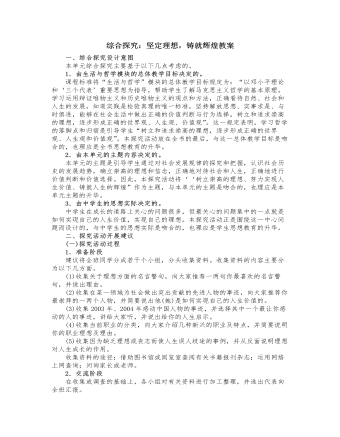
人教版高中政治必修4综合探究:坚定理想,铸就辉煌教案
理想扎根在实践的土壤中理想当然是重要的,但是不能把理想当成幻想或空想,理想必须扎根在实践的土壤中。青年人充满激情,这是非常重要的。古人有句话:“哀莫大于心死”。最大的悲哀就是没有追求,就像一团火焰熄灭了一样,即使到了我这个年纪也不能“哀莫大于心死”。青年人都有很高的激情,这是很好的。但是青年的激情往往不大稳定,过去人们说青年人的热情是“三分钟的热度”。这句话不一定准确,但青年人在这一点上应该有一个正确的认识。记得我大学毕业时,对于走向社会、走向生活充满了幻想,认为生活中的一切都是美好的,是典型的理想主义者,因此,对自己不能正确的估价,好高骛远,只愿做大事,不愿也不注意从小事积累。列宁说过,大事是由小事积累而成的。我当初毕业时,一方面充满了激情,另一方面也确实过高地估计了自己。
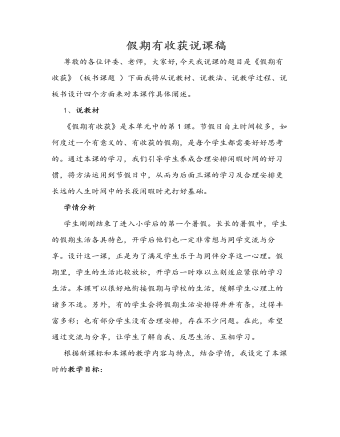
人教部编版道德与法制二年级上册假期有收获说课稿
⑷如果你在小区里,遇到小强,你会怎样做?你真是一个善良友好的孩子。你还要提醒他一个人不乱跑,真有法治安全意识。5.听了大家的建议,小强真的找到好朋友啦,看。他主动和小朋友们一起玩,多开心呀!6.交流:暑假里你有什么烦恼吗?说给小伙伴听一听,也请他们出出主意。同伴互助,交流讨论。指名交流:同学们讨论得真热烈,烦恼都解决了吗?谁想和大家分享?你来。哦,你有和小强同样的烦恼。现在解决了吗?你爸爸妈妈给你报了许多兴趣班呀?同学给你出了什么主意来解决呢?对,首先要知道爸爸妈妈是为你好,同时也可以和他们商量一下,合理安排时间,选择最感兴趣的班去上,做到劳逸结合,学得也会更好,对吗?7.看来,面对可能遇到的烦恼,同学们都能认真思考,用心过暑假,我们的收获会更多。(板贴:用心过)

新人教版高中英语必修1Unit 1 Teenage Life-Listening and Speaking & Listening and Talking教案
Step 2 Listening and Talking1. The teacher is advised to talk with their new students about the related topic: Boys and girls, do you know some structures to talk about future activities? Talking about future activitiesWe’ll …I plan to …There’ll be …I hope to …We’re going to …2. After their small talk, the teacher can move on by playing the listening and solve the following task.Underline the expressions in the sentences below Cao Jing and Max use to talk about the future.We’ll learn useful skills.I plan to improve my spoken English.There’ll be students from different schools.I hope to make new friends.We’ll talk about teenage life.I’ll learn to make a fire.There’ll be students from different countries at the camp.There’ll be some experts there to show us how to live in the wild.We’re going to learn about wildlife.I’m going to give a speech.I think I’m going to enjoy the activities.I think we’ll have a lot of fun.3. Work in groups. Plan a youth camp.Teacher make the Ss think of ideas for the camp. And they can use the questions below to get started. And have the Ss present their ideas for a youth camp to the class.●What kind of camp is it?●Who will be there?●What will they do?●What will they learn?

新人教版高中英语必修1Unit 2 Travelling Around-Listening and Speaking & Listening and Talking教案
【教学目标与核心素养】1. Instruct students to get main facts by listening and motivate them to talk about the topics about how to prepare for the trip and make reservations by listening and ultimately can make travel arrangements and reservations. 2. Develop students’ sense of cooperative learning and individual thinking capability. 3. Develop students’ different listening skills to solve different listening comprehensive problems.4. Help students to understand how to use the structures “the present continuous tense (be doing) is used to express future plans.【教学重难点】1. Teach students how to focus on key words, not on single words or grammar.2. Prompt Ss to talk about the related topics, such as how to prepare for the trip and make a travel plan.【教学过程】Step 1: Listening and SpeakingLead inThe teacher is advised to talk with their students about the places that they want to travel most both at home and abroad: boys and girls, if you have a chance to travel around the world, where will you go? After their small talk, the teacher can move on by finishing the following listening task:Before travelling, what do we need to prepare for the trip?

新人教版高中英语必修1Unit 3 Sports and Fitness-Listening and Speaking & Listening and Talking教案
Finally, after finishing the task above, the teacher is expected to instruct students to work in groups to finish the following project:Speaking ProjectWhat event or activity would you like to invite your friend to? Make a conversation with a partner.Ski Race: Zhangjiakou, a beautiful city in northern China, will host the Youth Ski Race in December.Track Meet: a great event for track –and –field lovers on 26 October.Gym Class: come and work out at a gym! You can make it.Part 2: Listening and Talking:The teacher is advised to talk with their new students about the related topic: Boys and girls , what do you think of sportsmanship? Let’s listen and find out:Play the listening and match each opinion with the right speaker. Who do you agree with? Why?Cao Jing _____________ Lily _____________ Max _____________A. An athlete should do his/her best to win.B. The girl should stop and help the other girl. Good sportsmanship is more important than wining!C. An athlete should think about honor and his/her fans if he/she is competing for his/her country.Listen again and circle the expressions that you hear in the conversation.

新人教版高中英语必修1Unit 3 Sports and Fitness- Discovering Useful Structures—tag questions教案
【教材分析】This teaching period mainly deals with the grammar: tag questions.This period carries a considerable significance to the cultivation of students’ spoken English. The teacher is expected to enable students to master this period thoroughly and consolidate the knowledge by doing some exercise of good quality.【教学目标与核心素养】1. Get students to have a good understanding of the basic usages of tag questions.2. Enable students to use the basic phrases structures flexibly.3. Develop students’ speaking and cooperating abilities.4. Strengthen students’ great interest in grammar learning.【教学重难点】1. How to enable students to have a good understanding of the basic usages of tag questions.2. How to enable students to use the basic usages of tag questions flexibly.【教学过程】Step1: 语法自主探究一、基本组成方法1.肯定式陈述部分+否定附加疑问部分(前肯后否) You often play badminton, don’t you? 你经常打羽毛球,是吗?You are going to the gym with me, aren’t you?你要和我一起去健身房,是吗?She’s been to shanghai before, hasn’t she? 她以前去过上海,是吗?2.否定式陈述部分+肯定附加疑问部分(前否后肯) It isn't a beautiful flower, is it? 那不是美丽的花,是吗?You didn't go skating yesterday, did you? 你昨天没去滑冰,是吗?They can’t finish it by Friday, can they?他们不能在星期五之前完成,是吗?

新人教版高中英语必修3Unit 1 Festivals and celebrations-Discovering Useful Structure教学设计
4.That was an experience that frightened everyone. →That was _____________________. 答案:1. taking 2. being discussed 3. in the reading room 4. a frightening experienceStep 6 The meaning and function of V-ing as the predicative动词-ing形式作表语,它通常位于系动词后面,用以说明主语“是什么”或“怎么样”一种表示主语的特质、特征和状态, 其作用相当于形容词; 另一种具体说明主语的内容, 即主语等同于表语, 两者可互换。The music they are playing sounds so exciting. 他们演奏的音乐听起来令人激动。The result is disappointing. 结果令人失望。Our job is playing all kinds of music. 我们的工作就是演奏各种音乐。Seeing is believing. 眼见为实。Step 7 Practice1. It is ________(amaze) that the boy is able to solve the problem so quickly.2. Buying a car is simply _______(waste) money. 3. Please stop making the noise—it’s getting ________(annoy). 4. complete the passage with the appropriate -ing form.La Tomatina is a festival that takes place in the Spanish town Bunol every August. I think many food festivals are __________ because people are just eating. however, this festival is _________ because people don't actually eat the tomatoes. Instead, they throw them at each other! the number of people ________ part in this tomato fight, can reach up to 20,000, and it is a very __________ fight that lasts for a whole hour. The _______ thing is how clean Bunol is after the tomatoes are washed away after the fight. this is because the juice form tomatoes is really good for making surfaces clean!答案:1. amazing 2. wasting 3. annoying4. boring interesting taking exciting amazing

新人教版高中英语必修3Unit 1 Festivals and Celebrations-Reading and Thinking教学设计
The topic of this part is “Discover the reasons for festivals and celebrations.The Listening & Speaking & Talking part aims at talking about the experiences and feelings or emotions about the festivals and celebrations. This section aims at detecting the reason why the people celebrate the festivals, the time, the places, the types and the way of celebrations. It also explains why some traditions in the old celebrations are disappearing, like the firecrackers in the big cities and some new things are appearing like the prosperity of business or commerce. 1. Students can talk about what festivals they know and the reasons and the way of celebrating them.2. Students should learn the reading skills such as the headline and get the topic sentences, the structures of articles.3. Students can understand the past, the present situation of some festival around the world and why there are some changes about them. 4. Students can have the international awareness about the festivals.1. Students should learn the reading skills such as the headline and get the topic sentences, the structures of articles.2. Students can understand the past, the present situation of some festival around the world and why there are some changes about them.Step 1 Lead in---Small talkWhat festival do you like best ? Why ?I like the Spring Festivals because I can set off the fireworks, receive the lucky money and enjoy the Gala with my families.Step 2 Before reading---Pair workWhy do people celebrate different festivals ?The Spring Festivals is to celebrate the end of winter and the coming of spring and new life.The Mid-autumn Day is to celebrate the harvest and admire the moon.

新人教版高中英语必修3Unit 1 Festivals and Celebrations-Listening &Speaking&Talking教学设计
The theme of this section is “Talk about festival activities and festival experiences”.Festival and holiday is a relaxing and interesting topic for students. This part talks about the topic from the daily life of students’. In the part A ---Listening and Speaking, there are three conversations among different speakers from three countries(Japan, Rio and China), where the speakers are participating in or going to participate in the festivals and celebrations. So listening for the relationship among them is a fundamental task. Actually, with the globalization and more international communication, it is normal for Chinese or foreigners to witness different festivals and celebrations in or out of China. In the Conversation 1, a foreign reporter is interviewing a Japanese young girl who just had participated in the ceremony of the Coming-of-Age Day on the street and asking her feeling about the ceremony and the afterwards activities. Conversation 2, Chinese girl Li Mei is witnessing the Rio Carnival for the first time, and her friend Carla gives her some advice on the costumes which enables her to match with the carnival to have a good time. Conversation 3, a Chinese guide is showing a group of foreign visitors around the Lantern Festival and introducing the customs of the festival to them. The three conversations have a strong vitality and insert the festival and cultural elements from different countries. So perceiving the festivals and cultures from different countries is the second task. At the same time, the scripts also insert the targeted grammar --- v-ing as attributive and predicative, which students can perceive and experience in a real context and make a road for the further study. That is the third task. In the Part B--- Listening and Talking, the theme is “Talk about festival experience”, which is the common topic in our daily conversations. During the conversation, Song Lin, a Chinese student, asked Canadian friend Max about how to spend Christmas. In the conversation, Song Lin talked about experience and the feelings during the Chinese Spring Festival, during which there are not only some enjoyable things but some unpleasant things. After the listening, perhaps students find there are some similarities between Christmas and the Chinese Spring Festival as there are some differences in the origins and celebrations. For example, people always visit friends and relatives, decorate their houses, have a big dinner together, chat and give presents to each other.

新人教版高中英语必修3Unit 1 Festivals and Celebrations-Reading for writing教学设计二
Step 3 Analyzing article structureActivity 31. Teachers raise questions to guide students to analyze the chapter structure of this diary and think about how to describe the festival experience. (1)What should be included in the opening/body/closing paragraph(s)?(2)How did the writer arrange his/her ideas?(3)What kind of interesting details did the writer describe?(4)How did the writer describe his/her feelings/emotions during the event?2. Students read and compare the three sentence patterns in activity 2. Try to rewrite the first paragraph of the diary with these three sentence patterns. After that, students exchange corrections with their partners. Such as:●This was my first time spending three days experiencing the Naadam Festival in China’s Inner Mongolia Autonomous Region and it was an enjoyable and exciting experience. ●I'll never forget my experience at the Naadam Festival because it was my first time to watch the exciting Mongolian games of horse racing, wrestling, and archery so closely. ●I'll always remember my first experience at the Naadam Festival in China’s Inner Mongolia Autonomous Region because it was so amazing to spend three days witnessing a grand Mongolian ceremony. Step 4 Accumulation of statementsActivity 41. Ask the students to read the diary again. Look for sentences that express feelings and emotions, especially those with the -ing form and the past participle. Such as:● …horse racing, wrestling, and archery, which are all so exciting to watch. ● some amazing performances● I was surprised to see…● I was a little worried about. . . ● feeling really tiredOther emotional statements:●I absolutely enjoyed the archery, too, but the horse races were my favourite part. ●I'm finally back home now, feeling really tired, but celebrating Naadam with my friend was totally worth it. ●He invited me back for the winter to stay in a traditional Mongolian tent and cat hot pot. I can’t wait!2. In addition to the use of the -ing form and the past participle, the teacher should guide the students in the appreciation of these statements, ask them to memorize them, and encourage them to use them reasonably in writing practice.

新人教版高中英语必修3Unit 1 Festivals and Celebrations-Reading for Writing教学设计一
The topic of this part is “Write about your festival experience”.During the Listening and Speaking and Talking, students are just asked to say out their festival experiences such as the Spring Festival, Mid-autumn Day, but this part students will be asked to write down their own festival experiences. During the reading part, it introduces the Naadam Festival in Inner Mongolia Autonomous Region, which can give students a good example to imitate. Students not only learn the festival, but touch and feel the Inner Mongolian’s character, the spirit and cultural atmosphere, which can help students form the cultural awareness and learn to enjoy and value the diversity of Chinese culture.Concretely, the dairy tells the experience that the author spent the Naadam Festival in Inner Mongolia Autonomous Region with his/her friend. The structure is clear. In the opening paragraph, it introduces the topic of the Naadam Festival and the whole feeling. Then it introduces the items of the festival like the ceremony, wrestling and horse racing. Finally, it summarizes this experience. Because this part is a travel journal, we must guide students pay more attention to these details: 1. use the first person. 2. use the past tense to tell the past thing and use the present or future tense to describe the scenery. 3. use the timeline to tell the development. 4. be careful for the author’s psychology, emotion and feeling, etc.1. Read quickly to get main idea; read carefully to get the detailed information about Naadam Festival.2. Learn the structure of the reading article and language.3. Write an article about a festival experience4. Learn to use the psychology, emotions and feeling in the writing.1. Write an article about a festival experience.2. Use the structure of the reading article and language.

新人教版高中英语必修3Unit 2 Morals and Virtues-Discovering Useful Structure教学设计
1. 表示时间。Hearing these stories, I’m skeptical about the place. = When I heard these stories. . . 2. 表示原因。Not knowing his address, I can’t send this book to him. = Because/Since/As I don’t know his address. . . 3. 表示结果。His father died, leaving him a lot of money. =. . . and left him a lot of money4. 表示条件。Going straight down the road, you will find the department store. = If you go straight down the road. . . 5. 表示让步。Being tired, they went on working. =Although they were tired. . . 6. 表示行为方式、伴随情况或补充说明。He lay on the grass, staring at the sky for a long time. =. . . and stared at the sky for a long time注意:非谓语动词作状语时, 如所提供的动词不能和句子中的主语保持一致, 动词-ing形式必须有自己的逻辑主语, 通常由名词或代词来担任, 这就是独立主格结构。The last bus having gone, we had to walk home. (having gone的逻辑主语是the last bus, 而不是we)Weather permitting, the football match will be played on Friday. (permitting的逻辑主语是time, 而不是the football match)Step 7 Practice1. ________(study) hard, you are sure to get first prize. 2. People use plastic in their daily life, _______(leave) large amounts of waste. 3. ________(work) hard at your lessons, you are to succeed. 4. The old man, ____________(work) abroad for twenty years, is on the way back to his motherland. 5. ______________(finish) his homework, he was playing on the playground. Answers: 1. Studying 2. leaving 3. Working 4.having worked 5. Having finishedStep 8 HomeworkFinish the homework on Page 22.

新人教版高中英语必修3Unit 2 Morals and Virtues-Listening &Speaking&Talking教学设计
Example:One day, a poor boy who was trying to pay his way through school by sending newspapers door to door found that he only had one dime(一角)left. He was so hungry that he decided to beg for a meal at the next house.However, he lost his nerve when a lovely young woman opened the door. Instead of a meal he asked for a drink of water. She thought he looked hungry so she brought him a large glass of milk. He drank it slowly, and then asked, “How much do I owe you?” “You don’t owe me anything,” she replied, “Mother has taught me never to accept pay for a kindness.” “Then I thank you from the bottom of my heart.” With these words, Howard Kelly left that house.Years later the woman became badly ill and was finally sent to the hospital in a big city. Dr. Howard Kelly, now famous, was called in. When he heard the name of the town she came from, a strange light filled his eyes. Dressed in his doctor’s clothes, Dr. Kelly went into her room and recognized her at once. From that day on, he gave special attention to her, and decided to do his best to save her life.At last the woman was saved. Dr. Kelly asked the business office to pass the final bill to him. He looked at it and then wrote something on the side. The bill was sent to the woman’s room. She was afraid to open it because she was sure that it would take the rest of her life to pay for it off. Finally she looked, and the note on the side of the bill caught her attention. She read these words: “Paid in full with a glass of milk, Dr. Howard Kelly.” Tear of joy flooded her eyes.

新人教版高中英语必修3Unit 2 Morals and Virtues-Reading and Thinking教学设计
The topic of this part is “Learn to make choices in life”.The Listening & Speaking & Talking part aims at the moral dilemmas, and this part is about making choices in life. The heroin is Lin Qiaozhi, a famous medical scientist, made a great contribution to our country’s medical care. Most importantly, her life experience can inspire our students whether in studying or the development of career. she had moral dilemmas and life choices, which are similar to the students who will step into society. Besides, Lin has quite good virtues like kindness, self-improvement, insistence, job-loving , generosity and responsibility, which is worth being learned.Concretely, this article is a biography about Lin Qiaozhi. The article tells her whole life according the timeline, among which the life choices is emphasized. For example, whether married or chased her dream, returned home or stayed abroad, family or public, her choices all reflected her faith, spirit, responsibility and devotion.1. Fast reading to get the detailed information about Lin Qiaozhi; careful reading to do the deductive information.2. Learn the reading skills--deductive judgement according the context.3. Study the structure features and language features. 4. Communicate about Lin’s life choices and reflect their own life choices.1. Learn the reading skills--deductive judgement according the context.2. Study the structure features and language features.3. Communicate about Lin’s life choices and reflect their own life choices.Step 1 Lead in---Small talkWhat are some important life choices?Importance choices: university study, jobs and marriage partners. Because they can determine our future.

新人教版高中英语必修3Unit 2 Morals and Virtues-Reading for Writing教学设计
1. 这个寓言是一个关于一位国王古寓言。 The fable is an old fable about a king.2.作者用这个故事让读者对于社区的问题负有个人责任的必要印象深刻。The author used the story to impress upon readers with the need to take personal responsibility for problems in the community.3. 这个故事十分成功的实现了它的目的。The story was quite successful in achieving its purpose.Step 7 WritingPlease write a review of the story according the outline above.The fable is an old fable about a king who thought his people are lazy, so he put a large stone in the middle of the road and hides and waited to see if anyone will try to move it.The author used this story to impress upon readers with the need to take personal responsibility for problems in the community. The story was quite successful in achieving its purpose, and I liked it because it had a clear moral.However, while the moral of the story is clear, the actions of the king seemed pointless to me, because none of the characters in the story learnt anything. For this reason, I think there are better stories that can be used to impress upon people with the need for personal responsibility.Step 8 Pair workExchange drafts with a partner. Use this checklist to help your partner revise his/her draft.1. Does the writer give a short description of the story ?2. Does the description include the most important details of the story ?3. Does the writer give his or her opinion about the character or their actions ?4. Is the review well-organised ? 5. Does the writer use the -ing form as the adverbial correctly in the writing ?6. Are there any grammar, spelling, or punctuation errors ?Step 9 HomeworkPut up your revised draft in the classroom or read it to your class.